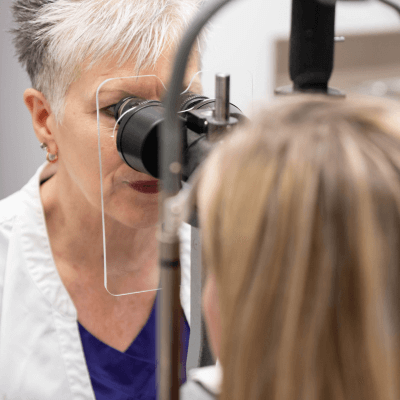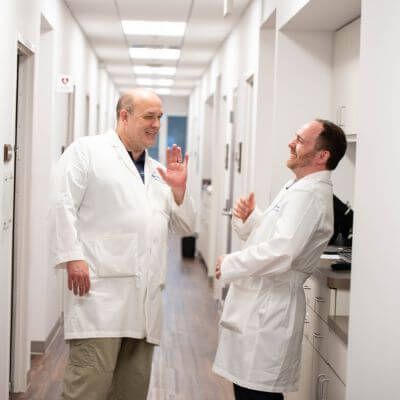LASIK Eye Surgery—Your Ultimate Guide To Stronger Vision
LASIK surgery is a fantastic procedure that has improved countless people’s lives. It can help reduce the need for prescription glasses or contacts or possibly result in you no longer needing them at all. Unfortunately, LASIK isn’t something you can just sign up for. It requires medical approval, planning, and knowing what to expect.
We’ve developed this comprehensive guide to help you on your way to LASIK. We’ve broken it down into five main sections:
- What is LASIK surgery?
- LASIK Surgery Risks
- What can I expect before laser eye surgery?
- What happens during LASIK surgery?
- LASIK Recovery
What is LASIK surgery?
Short for laser-assisted in situ keratomileusis , LASIK eye surgery helps treat problems with the cornea. Your eyes work similarly to a film camera, using reflection to create images through the cornea and onto the retina. Unfortunately, your cornea can be misshapen and interfere with this natural refraction process. This results in refractive errors that make it difficult to see clearly.
There are three types of refractive errors:
- Myopia
- Hyperopia
- Astigmatism
Myopia is another term for nearsightedness and can make it difficult to see objects that are far away. Hyperopia is the opposite of myopia and is also known as farsightedness, making it difficult to see things that are close to your face. Astigmatism results from a misshapen lens or cornea, creating distorted images on the retina.
There are a few different refractive surgeries ophthalmologists can use to treat refractive errors. With LASIK, we’re able to remove refractive problems with a special laser that allows us to reshape the cornea and help it focus. This allows you to experience:
- The ability to see more details
- Improved confidence in your vision
- A better quality of life
LASIK Surgery Risks
LASIK-related complications are rare. However, it’s wise to know what they are so you can spot them and get immediate treatment. These include:
- Infection
- Double vision
- Regression
- Undercorrections
- Overcorrections
- Glare
- Halos
There are also common side effects such as dry eyes and glare. Fortunately, these symptoms don’t last long and will typically start to fade a few weeks or months following your surgery. Talk to your surgeon about using eye drops and pain relievers to alleviate these symptoms.
Click here to learn about one of our satisfied LASIK patients. Laser eye surgery has come a long way over the years and we were able to treat her severe astigmatism!
What can I expect before laser eye surgery?
It’s important to understand that there are steps you must take before you can undergo laser eye surgery. The first step is to schedule a consultation with one of our eye surgeons to see if you’re a candidate for LASIK surgery. Next, you’ll need to prepare for your surgery to help ensure the best results possible.
It Starts With a Consultation
You’ll meet with one of our surgeons for a free consultation before you can sign up for a LASIK procedure. This establishes whether you’re a good candidate for surgery or not. While LASIK has many benefits, it’s not the right option for everyone. It’s the job of our well-trained surgeons to spot any factors that may disqualify you in order to protect the long-term health of your vision.
Good candidates for LASIK
will have:
- An eye prescription that’s remained consistent since last year
- Corneas that are healthy and thick enough for LASIK
- A refractive error that can be treated with LASIK
- Realistic expectations for what LASIK can do
- Stable refraction
- Be at least 18 years of age
Factors that may disqualify you include:
- Corneas that are too thin
- Severe cases of myopia, hyperopia, or astigmatism
- Poorly managed diabetes
- Advanced glaucoma
- Corneal scarring or keratoconus
- Severe dry eye
This list isn’t exhaustive. There are other factors that can qualify you as a good candidate, or disqualify you as a candidate for surgery. Your eye surgeon will take measurements of your eyes, including the size of your cornea, pupil, and your refractive error. This helps ensure your safety before, during, and after your LASIK procedure.
Click here to learn more about qualifying for LASIK in Knoxville, TN!
Preparing for LASIK Eye Surgery
You’ll start preparing for your procedure once your surgeon gives you the go-ahead. This is especially important for anyone who:
- Wears contact lenses
- Takes any medications
- Wears cosmetics, lotions, or perfumes
People who wear contact lenses will need to stop wearing them and switch to eyeglasses for a few weeks before surgery. Contacts can change the shape of your cornea, so it’s important that it be in its natural shape to get the best results possible. We’ll provide you with instructions based on the type of contacts you wear and how long you have been wearing them.
It’s important to tell your surgeon about any medications you may be taking , including over-the-counter (OTC) medicines. OTCs such as decongestants and even acne medicines can cause complications during your surgery, so it’s crucial that you share this information so your surgical team can plan ahead.
Cosmetics, lotions, and perfumes should not be worn on the day of your surgery. Eye cosmetics such as mascara can actually increase your risk of infection, which we do everything in our power to prevent. Perfumes and lotions can interfere with the laser causing it to not work properly, and leaving you with less than ideal results.
You’ll also need to arrange a ride to and from surgery. You may be given medication to help you relax during surgery along with eye-numbing drops, which can make driving a vehicle dangerous. LASIK is usually a short procedure, so ask a friend or family member to help you get back home.
To learn more about preparing for LASIK, click here !
What happens during LASIK surgery?
One of the biggest benefits of LASIK surgery is how short it lasts. Most procedures take less than half an hour, which gives you more time to go home, rest your eyes, and relax for the rest of the day. This can also help motivate whoever you recruit to take you to and from surgery since it won’t take up a large chunk of their day.
Getting Prepped
You will be provided with a mild sedative before surgery to help you relax. Once in the procedure room, you’ll sit in a reclining chair and lay flat on your back. You’ll see the LASIK machine used to perform the procedure, which is a large machine with a computer screen and microscope.
Once you’re in the chair, someone in your surgical team will numb your eye with special eye drops and sterilize the area around your eye. Your safety is always our number one priority, and you can have peace of mind knowing that our team will do everything they can to get the best results while keeping you as comfortable as possible. Follow any instructions your surgeon gives you to do your part for the best results.
LASIK Treatment
A corneal flap can be made mechanically or with a laser. At Baptist Eye Surgeons, we only use the laser method as it is far superior and safer to the mechanical method. We’re dedicated to using the most up-to-date techniques in the safest environments. This helps us ensure that you get the best results possible with minimum side effects.
Your surgeon will begin by putting a suction ring on your eye. You’ll feel some pressure and your vision will go dim, but this part doesn’t last long. The suction ring will stay in place for about a minute and it only takes about 12 seconds to create the flap. A flap will be made in each eye that’s being treated.
Once the flap has been made, a lid speculum is used to hold your eyelids open and prevent blinking. Your surgeon will gently lift the flap and have you look at a blinking light. But don’t worry if you move your eye during the procedure. Our laser is equipped with iris-recognition technology to find your pupil and track it throughout the surgery.
It takes less than a minute for your cornea to be reshaped with the laser. Once that’s done, your flap is put back in place and the lid speculum is removed. All told, the entire process takes less than 30 minutes for both eyes .
Plan for your vision to be hazy and blurry for the rest of the day, so make sure you arrange a ride to and from surgery . You may also experience a slight burning sensation, almost like an eyelash in your eye. This feeling is temporary and, like other side effects, should improve significantly by the next day.
Are you interested in taking a closer look at what to expect during laser eye surgery? Read What Happens During a LASIK Procedure? to find out more!
LASIK Recovery
You have a lot to be excited about after your laser eye surgery, but they don’t come all at once. You’ll still need time to recover and for your eyes to stabilize in order to see the best results from your surgery. Not only that, but you’ll also need to take certain precautions to keep your eyes healthy and protected from infections.
After Surgery
Now that your surgery is complete, it’s time to rest and recover. It’s perfectly normal to experience:
- Itching
- Burning
- Grittiness
- Watery eyes
- Feeling like something is stuck in your eye
Some patients report mild pain after surgery, but it’s no reason to panic. Your surgeon will likely recommend a mild OTC pain reliever to alleviate any side effects you may experience after your procedure. It’s important to report any symptoms or side effects to your surgical team so they can recommend the best solution for relief.
On top of eye discomfort, you may experience some vision problems, too. This may include:
- Glare
- Starbursts
- Halos around lights
It’s also normal for your eyes to appear red or bloodshot shortly after surgery.
How to Treat Temporary Side Effects
The above side effects are perfectly normal and to be expected after LASIK. Keep a bottle of lubricating eye drops on hand to help alleviate your symptoms. Your surgeon will recommend the best ones for your eyes.
These drops will help with any:
- Redness
- Itchiness
- Irritation
Having some Tylenol or other mild pain reliever helps with any minor pain you may experience.
It’s also a good idea to take a few days off from work after your surgery. Side effects such as glare and sensitivity to light can impede your vision, making daily tasks more difficult or even dangerous. Avoid these issues by staying home until your side effects have time to dissipate and your vision goes back to normal.
When should I contact my doctor?
You’ll have scheduled doctor’s visits for at least six months following your surgery. This helps them gauge your progress as well as spot any issues that may be developing. However, you should still contact your eye surgeon if your side effects last more than a couple of days. It’s especially important to contact them if pain or sensitivity gets worse rather than improves.
What kind of results can I expect?
If you’re interested in LASIK then you want to improve your vision. Chances are you’re tired of having to wear glasses or contacts all the time, keeping up with your prescription glasses and sunglasses, or the cost of contacts. Regardless of your exact reason, LASIK may be the right solution for you.
As the Journal of Cataract & Refractive Surgery points out, 90% of LASIK patients experience 20/20 vision or better, and 99% report better than 20/40 vision after surgery. On top of those numbers, 96% of patients report being satisfied with their results — the highest of any elective medical procedure.
It’s important to remember that your results will vary depending on why you needed LASIK and any other factors that may affect your vision. The best results tend to be seen in patients with low-grade nearsightedness. Results for patients with farsightedness, astigmatism, or severe cases of nearsightedness are more challenging to predict, but can often be treated with great success.
Click here to learn what to expect after LASIK!
Visiting Your Doctor for Follow-Ups
You’ll need to visit your eye doctor within 48 hours following your procedure for an evaluation. During this visit, they will administer a vision and eye exam.
Your eye surgeon will follow up with you for at least six months in order to monitor your progress. They may recommend or prescribe something to help with side effects and prevent complications, such as eye drops. These can help keep your eyes lubricated while reducing inflammation and your risk of infection.
Take care to not wear contacts until your doctor gives you the go-ahead, even if your vision is blurred. You should also avoid playing sports for one to three days after your procedure.
Avoid Infections
To prevent infections, refrain from using any creams, lotions, or eye makeup. Talk to your doctor to learn when you can start wearing these products again. They may also recommend gently cleansing your eyelashes with a cloth and warm water.
Avoid using:
- Swimming pools
- Whirlpools
- Hot tubs
You can get back in the water in a couple of months.
Vision Changes After Laser Eye Surgery
Be patient as your eyes recover from surgery and begin to work at their new and improved level. There will be some fluctuations in the quality of your vision in the first few months, so it pays to be patient. You may have trouble driving at night, see halos around lights, or experience glare during this time. If these symptoms are persistent, speak to your surgeon immediately.
You should also be aware that, while your distance vision may improve after LASIK, other pre-existing problems may not. LASIK surgery helps improve your distance vision, but this doesn’t always get rid of issues like glare or halos.
When considering LASIK surgery, there are some important things that you need to know. For one, you need to know that it’s a surgical procedure specifically designed to improve your distance vision. You should also be aware of the temporary side effects that commonly follow surgery, as well as rare possible complications.
you need to know that it’s a surgical procedure specifically designed to improve your distance vision. You should also be aware of the temporary side effects that commonly follow surgery, as well as rare possible complications.
Before scheduling your surgery, you’ll need to have a consultation with one of our surgeons to see if you qualify. Once you’ve been approved, you’ll need to start preparing for surgery by not wearing contacts, eye makeup, and anything else that your surgeon requests. This helps ensure that you get the best possible results.
Laser eye surgery usually takes less than half an hour. While it doesn’t take long, side effects from surgery can last the rest of the day and make it difficult to see, so make sure to arrange a ride to and from surgery. You will have multiple follow-up sessions with your surgeon. This is to help monitor the progress of your eyes as well as catch any problems that may develop.
Are you ready to get started on your LASIK journey? Contact us today to schedule your free consultation!
LASIK surgery is designed to help improve your distance vision. Complications are rare, although there are some common, temporary side effects after surgery. You’ll need to schedule a consultation with one of our surgeons to decide if you’re a good candidate for treatment. Once approved, you can start preparing for surgery.
All told, the process usually takes less than half an hour. However, you’ll need to arrange a ride to and from surgery since it won’t be safe to drive on your own afterward. You’ll have several follow-ups with your doctor after surgery to monitor your progress and catch any issues that may be developing.
Baptist Eye Surgeons is an ophthalmological practice in Knoxville, TN, and Morristown, TN. Give us a call at 865-579-3920 for more information or to schedule an appointment .





